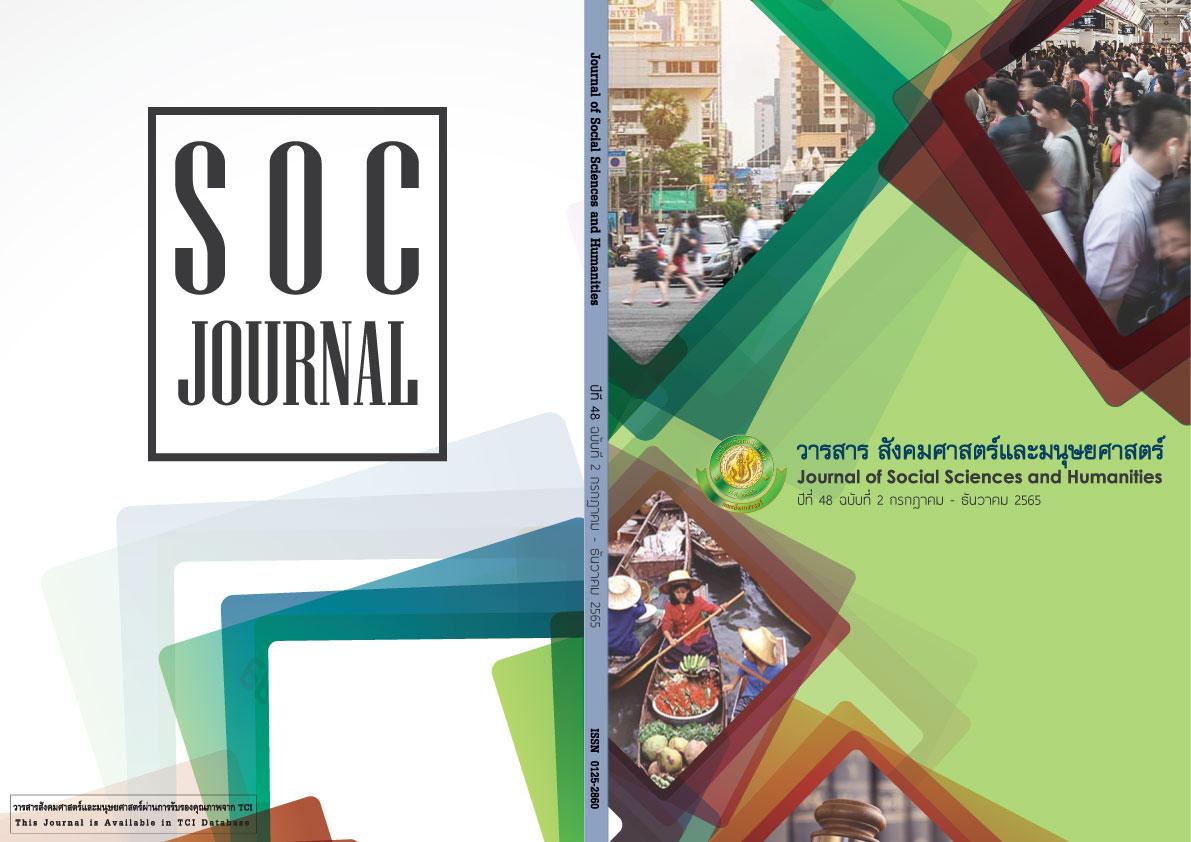วาทกรรมนโยบาย เทคนิคการตีความและวิพากษ์สู่การสร้างข้อโต้แย้งทางทฤษฎี
Main Article Content
บทคัดย่อ
การศึกษาวาทกรรมนโยบายแพร่หลายในสหภาพยุโรป สหรัฐอเมริกา รัสเซีย สิงคโปร์ จีนและอินเดีย ครอบคลุมนโยบายการต่างประเทศ การศึกษา การเปลี่ยนแปลงสภาพภูมิอากาศและการค้า หรือแม้กระทั่งความสัมพันธ์ระหว่างความยากจนกับการศึกษา ประสิทธิภาพการศึกษาวาทกรรมนโยบายสามารถสร้างความเข้าใจใหม่ภายใต้ปรากฎการณ์ทางสังคมเดิมที่ถูกสร้างขึ้นจากมนุษย์ ผ่านทางภาษา ข้อความ สัญลักษณ์และการสนทนาทำให้การวิเคราะห์วาทกรรมแสดงมุมมองการขาดศักยภาพของนโยบายและก่อให้เกิดการตระหนักต่อกลุ่มอิทธิพลหรือผู้มีส่วนได้ส่วนเสียกับนโยบาย โดยเฉพาะชนกลุ่มน้อย คนชายขอบหรือเสียงข้างน้อย การวิเคราะห์วาทกรรมนโยบายจึงมีบทบาทการเป็นเครื่องมือตีความและวิพากษ์จนสามารถผลิตชุดความรู้ใหม่ที่มีน้ำหนักเพียงพอต่อการโต้แย้งทฤษฎี บทความนี้จึงนำเสนอเทคนิคการวิเคราะห์
วาทกรรมนโยบายและขั้นตอน รวมถึงกรณีศึกษาวาทกรรมนโยบาย อาทิ ประเด็น กรอบการวิเคราะห์และการใช้ข้อมูลวิเคราะห์วาทกรรมนโยบาย
Article Details

อนุญาตภายใต้เงื่อนไข Creative Commons Attribution-NonCommercial-NoDerivatives 4.0 International License.
เอกสารอ้างอิง
Aistleitner, M. and Puehringer, S. (2021). The Trade (Policy) Discourse in Top Economics Journals. New Political Economy, 26(5), 748-764.
Allan, E. J. (2008). Policy Discourses, Gender, and Education: Constructing Women's Status. Routledge.
Allan, E. J. and Tolbert, A. R. (2019). Advancing Social Justice with Policy Discourse Analysis. In Strunk, K. K. and Locke, L. A. (eds). Research Methods for Social Justice and Equity in Education. (pp. 137-150). Palgrave Macmillan.
Bernhardsson, N. (2014). Contradicting Values in the Policy Discourse on Lifelong Learning. In Zarifis, G. K. and Gravani M. N. (eds). Challenging the ‘European Area of Lifelong Learning’ A Critical Response. (pp. 179-188). Springer.
Brown, M. and Klein, C. (2020). Whose Data? Which Rights? Whose Power? A Policy Discourse Analysis of Student Privacy Policy Document. The Journal of Higher Education, 91(7), 1149-1178.
Brugger, H. and Henry, A. D. (2021). Influence of Policy Discourse Networks on Local Energy Transitions. Environmental Innovation and Societal Transitions, 39, 141-154.
Carusi, F. T. and Niwa, T. (2020). Learning not to be Poor: The Impossible Position of Teachers in Aotearoa New Zealand Education Policy Discourse. Asia-Pacific Journal of Teacher Education, 48(1), 30-44.
Dai, L. (2019). Water Quality Knowledge and Water Policy Discourse in China. In Cai, K. G., Guang, P. and Lynch, D. C. (eds). Politics and Governance in Water Pollution Prevention in China. (pp. 7-26). Palgrave Macmillan.
Deng, W., Hsu, J.-H., Löfgren, K. and Cho, W. (2021). Who is Leading China's Family Planning Policy Discourse in Weibo? A Social Media Text Mining Analysis, Policy & Internet. 1-17.
Durnova, A. and Zittoun, P. (2013). Discursive Approaches to Public Policy. Revue Française de Science Politique, 63(3-4), 569-577.
Erdogan, B. (2017). Humanitarian Intervention and the Responsibility to Protect: Turkish Foreign Policy Discourse. Palgrave Macmillan.
Frear, M. and Mazepus, H. (2021). Security, Civilisation and Modernisation: Continuity
and Change in the Russian Foreign Policy Discourse. Europe-Asia Studies, 73(7), 1215-1235.
Hewitt, S. (2009). Discourse Analysis and Public Policy Research. Centre for Rural Economy Discussion Paper Series No. 24, October 2009. Newcastle University.
Kammerer, M. and Ingold, K. (2021). Actors and Issues in Climate Change Policy: The Maturation of a Policy Discourse in the National and International Context. Social Networks, 1-13.
Kiely, K. P. (2017). U.S. Foreign Policy Discourse and the Israel Lobby. Palgrave Macmillan.
Kuosmanen, S. (2021). Human Rights and Ideology in Foreign Policy Discourse: A Case Study of U.S. State Department Human Rights Country Reports 2000–2019. Discourse & Society, 32(4), 426-442.
Lynggaard, K. (2019). Discourse Analysis and European Union Politics. Palgrave Macmillan.
Power, S. and Taylor, C. (2021). School Exclusions in Wales: Policy Discourse and Policy Enactment. Emotional and Behavioural Difficulties, 26(1), 19-30.
Ro, J. (2020). Curriculum, Standards and Professionalisation: The Policy Discourse on Teacher Professionalism in Singapore. Teaching and Teacher Education, 91(2), 103-156.
Saqipi, B. (2019). Teacher Education Policy Discourse in the Midst of System Reorganisation and Policy Transfer: Lessons for Small and Developing Countries. International Journal of Management in Education, 13(1), 28–39.
Schlogl, L, Weiss, E. and Prainsack, B. (2021). Constructing the ‘Future of Work’: An Analysis of the Policy Discourse. New Technology. Work and Employment, 36(3), 307-326.
Schunz, S., Botselier, B. D. and Piqueres, S. L. (2021). The European Union’s Arctic Policy Discourse: Green by Omission. Environmental Politics, 30(4), 579-599.
Sheth, D. L. (2018). Minority Politics: The Shifting Terms of Policy Discourse. In deSouza, P. R. (ed). At Home with Democracy: A Theory of Indian Politics. (pp. 217-226). Palgrave Macmillan.
Song, A. M., Dressler, W. H., Satizabal, P. and Fabinyi, M. (2021). From Conversion to Conservation to Carbon: The Changing Policy Discourse on Mangrove Governance and use in the Philippines. Journal of Rural Studies, 82, 184-195.
Spratt, J. (2017). Wellbeing, Equity and Education: A Critical Analysis of Policy Discourses of Wellbeing in Schools. Springer.
Starkey, L. and Wood, B. E. (2021). A Critical Review of Learning Environment Policy Discourse in Aotearoa New Zealand. New Zealand Journal of Educational Studies, 56(1), 27-44.
Steigerwald, C. (2021). Shaping Cultural Policy Discourse in Germany: The Case of ‘Cultural Education’. International Journal of Cultural Policy, 1-18.
Swaffield, S. (1998). Contextual Meanings in Policy Discourse: A Case Study of language Use Concerning Resource Policy in the New Zealand High Country. Policy Sciences, 31, 199-224.
Swarnakar, P., Shukla, R. and Broadbent, J. (2021). Beliefs and Networks: Mapping the Indian Climate Policy Discourse Surrounding the Paris Climate Change Conference in 2015. Environmental Communication, 1-18.


